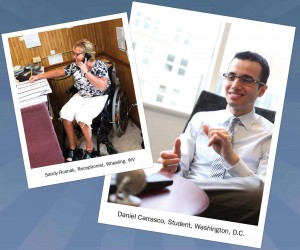Community Services
We offer supportive services to our community in three different areas.
- Our Foster Grandparent Programs offer assistance to children in our local schools
- The Ombudsman Program advocates for residents residing in long term care facilities
- Our Ticket to Work Program assist individuals with disabilities obtain employment
 Program Information
Program Information
Foster Grandparents are volunteers who help, guide and assist, and act as positive role models, sharing their time, talents and love with society’s most precious commodity…our children. Grandparents serve locally at schools, day care and Head Start center, and other youth based programming. Foster Grandparents help children who are at risk learn to read, provide one-on-one support and guide children at critical times in their lives. Put simply, they give the kind of comfort and love that sets a child on the path towards a successful future while profoundly enriching their own lives.
We invite you to become a Foster Grandparent and make a difference in the life of a child.
Eligibility Requirements
- 55 years of age or older
- Pass a federal and state background check
- Meet income criteria
- Disability in any form does not count as income
- Income limitations are dependent on how many are in the home
- Able to volunteer a minimum of 15 hours per week
Most importantly, you need to have the desire to make an impact on the life of a child through love, support, and service.
Benefits
- An hourly tax-free stipend of $4
- Paid time off
- Paid trainings
- Travel reimbursement
- Annual recognition events
- Experiencing the joy of making a difference in the lives of local children with exceptional needs
- Meet, train and socialize with other volunteers like you.
Brochure and Application
For additional information, please call 870-612-3000 or 1-800-382-3205
The Foster Grandparent Program is sponsored locally by White River Area Agency on Aging, Inc. and is federally funded by:

 The primary role of the ombudsman is to be an advocate for the health, safety, welfare, and rights of residents residing in long term care, residential care, or assisted living facilities. The ombudsman is a voice for the resident’s right to quality care that is free from abuse, neglect, discrimination, or retaliation.
The primary role of the ombudsman is to be an advocate for the health, safety, welfare, and rights of residents residing in long term care, residential care, or assisted living facilities. The ombudsman is a voice for the resident’s right to quality care that is free from abuse, neglect, discrimination, or retaliation.
Mission
The mission of the Arkansas Ombudsman Program is to assure long-term care facility residents have the right to live their lives harmoniously and with dignity, feeling free to voice complaints or concerns without reprisal.
The Ombudsman strives to be a trusted advocate for all residents by educating them regarding their rights; empowering residents to speak for themselves; while providing advocacy for those without a voice.
Through regular visitations, the Ombudsman seeks to enhance the quality of life for long-term care residents by the investigation of complaints and interacting with both residents and staff to facilitate the resolution of the problem.
Volunteer Ombudsman
Role of the Certified Volunteer Ombudsman
- Inform residents of their rights under Federal and State Law and assist them in protecting their rights
- Provide information about the Ombudsman Program to residents and families
- Refer complaints and concerns to the Regional Ombudsman
- Observe and report conditions in nursing homes to the Regional Ombudsman
- Perform regular visitation to one specific nursing home, assisted living or residential care facility
Qualifications required to obtain and maintain an active Certification as an Arkansas Certified Volunteer Ombudsman
- Must attend an 8-hour classroom training
- Must complete a 12-hour nursing home practicum
- Attend quarterly in-service training classes
- Encouraged to attend at least 1 state-sponsored quarterly training per year
For additional information, please call 870-612-3000, 1-800-382-3205, or visit the Arkansas Ombudsman website.
Other Links:
AR Department of Human Services
AR Advocates for Nursing Home Residents
 The Ticket-to-Work is a program administered by Social Security Administration for disability beneficiaries aged 18 through 64, who want to go to work.
The Ticket-to-Work is a program administered by Social Security Administration for disability beneficiaries aged 18 through 64, who want to go to work.
The goal of the Ticket-To-Work program is to increase opportunities for SSI and SSDI beneficiaries to obtain employment, so they can achieve greater personal satisfaction by maximizing earning potential and attaining self-sufficiency. The Ticket-To-Work program provides beneficiaries with a safety net, work incentives, and assistance in transitioning into the workforce.
Our goals are to help you realize your goals of financial independence.
Work Incentives:
- Continued cash benefits
- Continued Medicare and/or Medicaid
- Assistance with education, training and rehabilitation for a new job through partnering agencies
- Medical reviews are waived while making timely progress in the program
Benefits of Ticket-to-Work
- Assistance in understanding how working affects benefits
- Assistance and resources to help find a job
- Staying in control of your benefits
- Achieving greater personal satisfaction
- Ability to transition back into receiving benefits if needed
Helpful Links:
- Ticket-to-Work Brochure
- Social Security Red Book
- Timely Progress Guidelines
- Social Security Choose Work
White River Area Agency on Aging has a Social Security disability expert who is committed to helping increase your beneficiaries’ confidence by addressing how working affects benefits and assisting in decisions about options. WRAAA’s mission is to assist beneficiaries to become more independent and self-reliant.
Contact White River Area Agency on Aging to further discuss Ticket-to-Work and how its work incentives can offer opportunities for success in the workforce.
For additional information, please call (870) 612-3038.

